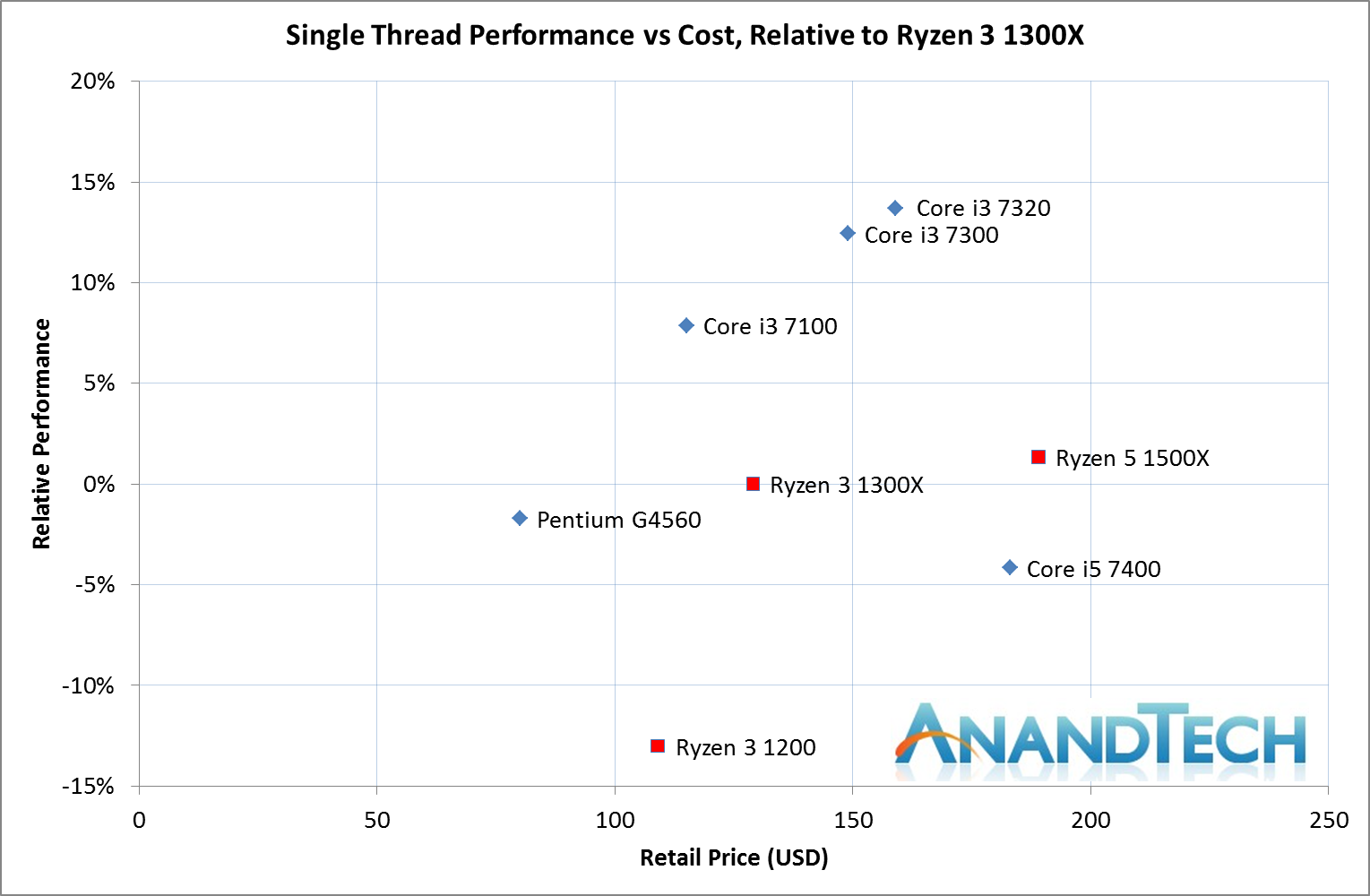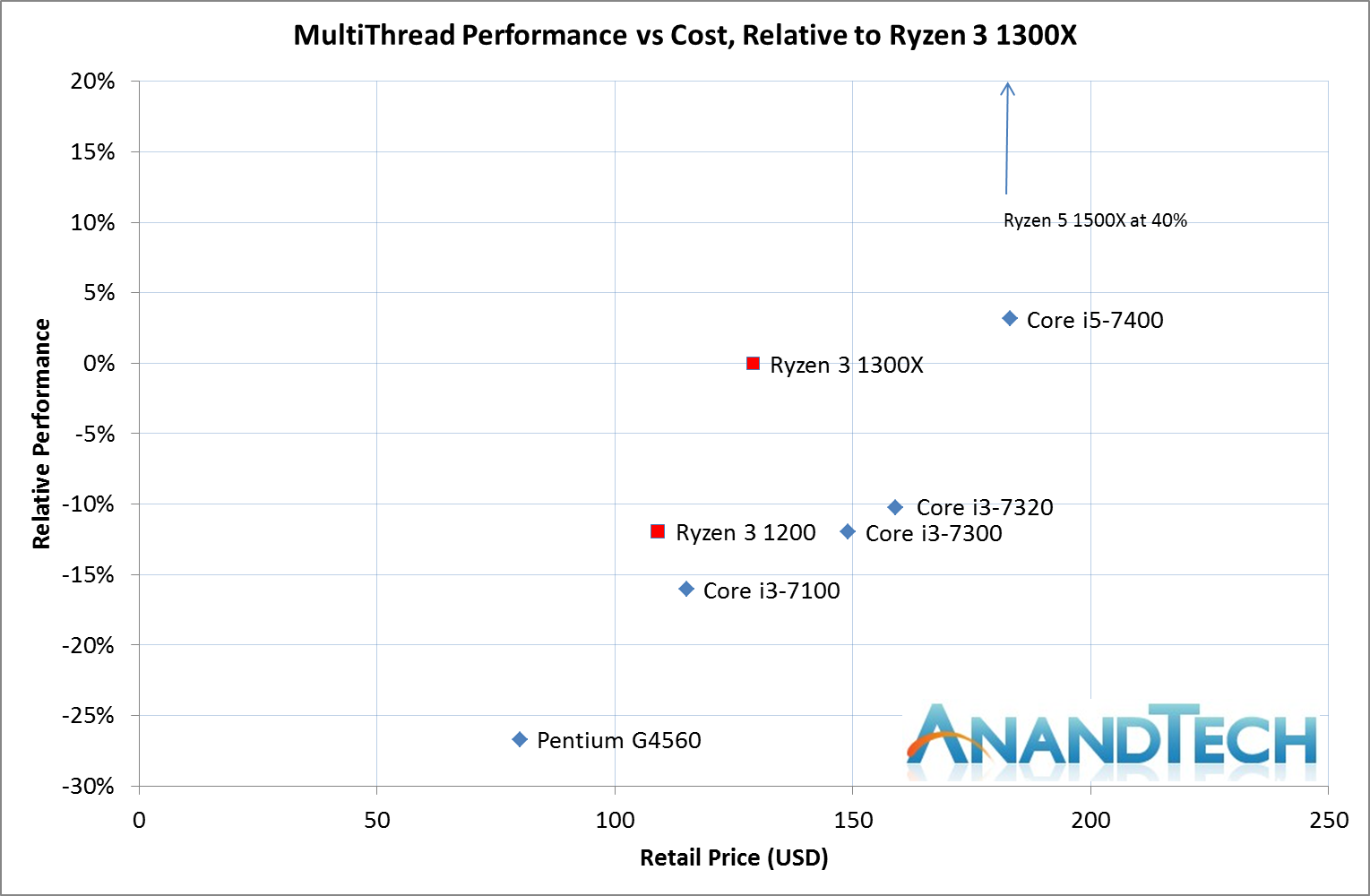The AMD Ryzen 3 1300X and Ryzen 3 1200 CPU Review: Zen on a Budget
by Ian Cutress on July 27, 2017 9:30 AM EST- Posted in
- CPUs
- AMD
- Zen
- Ryzen
- Ryzen 3
- Ryzen 3 1300X
- Ryzen 3 1200
Conclusion
For as much hype and excitement that has been generated around Zen and the Ryzen products so far, with everything focused on the high-end when we hit the lower elements of the stack and the volume parts, not much ‘excitement’ is to be had. We’ve already gone through the new fancy microarchitecture and the platform, and what matters at this end of the spectrum is a pure performance per dollar metric. So far the Ryzen 7 parts have certainly hit that goal, especially when originally compared to Broadwell-E when the Ryzen 7 parts per launched. For the Ryzen 3, the direct competition is Kaby Lake, and CPUs with a much higher IPC. But where Intel has two cores, AMD has four.
Diving straight into the graphs, the Single Thread performance graph is as follows. All data is shown relative to the performance of the Ryzen 3 1300X.
For the AMD CPUs, the 1300X and 1500X are near in base/turbo frequency (3400/3700 vs 3500/3700) and so score about the same, and the Ryzen 3 1200 at 3100/3400 scores about 13% lower.
The Intel CPUs here show a distinct curve from the Pentium G4560 at 3.5 GHz through the Core i3s at 3.9 GHz, 4.0 GHz and 4.1 GHz. The Core i5 7400 scores a lot lower here, with its base frequency of 3.0 GHz and a turbo up to 3.5 GHz.
For the multi-thread performance:
We shopped the graph here at +20% otherwise it would look odd, but the Ryzen 5 1500X with simultaneous multithreading gets a +40% boost over the 1300X, while the Ryzen 3 1200 sits again at around -12%. All the dual core intel parts lag behind here compared to AMD’s quad cores, although the Ryzen 3 1200 and the Core i3-7300 are closely matched – but the Ryzen wins on price by being ~$40 cheaper. The Core i5-7400, competes against the Ryzen 3 1300X here as they are both quad cores, and the Intel wins despite the lower frequency due to higher IPC – which comes at a $50+ premium.
For our combined all-in-one graph, we included our mixed workload data and weighted the results 40:50:10 for single:multi:mixed thread workloads.
If we ignore the Ryzen 5 1500X in the top right corner, there are a few stories here.
First is that the Ryzen 3 1200 does not look like an attractive option. It performs +2-3% of the Pentium but is $30 more expensive, and the Core i3-7100 beats it by 8% for only a sub-$10 cost.
Then there is the Ryzen 3 1300X. Compared to the Core i3-7300/7320 and the Core i5-7400, it clearly wins on performance per dollar all around. Compared to the Core i3-7100 though, it offers almost 5% more performance for around $10-15 more, which is just under 10% of the cost. Depending on budgets, each one could be an attractive option.
We’re still working through our gaming testing as this review goes live, and we’ll add graphs for that in a bit.













140 Comments
View All Comments
MajGenRelativity - Thursday, July 27, 2017 - link
You make a couple good points. Ryzen 3 is definitely on my watchlistiwod - Thursday, July 27, 2017 - link
What are the Power Load for each CPU and not whole system? Zen is more SoC like and harder to compare to Intel.Ian Cutress - Thursday, July 27, 2017 - link
System is variable. CPU numbers in a CPU review.ampmam - Thursday, July 27, 2017 - link
Great review but biased conclusion. Any idiot can sense it.MrCommunistGen - Thursday, July 27, 2017 - link
For us idiots, can you possibly elaborate what bias you're seeing?vMax65 - Thursday, July 27, 2017 - link
ampmam, good to know you are an idiot...Great review Ian.Ian Cutress - Thursday, July 27, 2017 - link
Biased in what way? I've been called an Intel shill and an AMD shill this week, will be glad to listen to what you think.Oxford Guy - Thursday, July 27, 2017 - link
Then don't open yourself up for these accusations by doing things like kneecapping Zen with 2400 speed RAM.If you think 2400 speed RAM is more beneficial than not then, at least, show the best case results for 3200 speed RAM and say "See — it's not important"
It's not good to see the same site that overclocking by telling people testing for serious stability isn't important and which pumps unwise levels of voltage in hobbling the RAM that's used to test Zen, a platform that most everyone knows benefits more from faster RAM than Intel does.
silverblue - Friday, July 28, 2017 - link
Perhaps it does, but it's not massive. Also, Ian did say he would test at faster settings at a later date.RAM prices are quite high at the moment for the higher clocked parts, which brings about an interesting observation - the Ryzen 3 is the cheapest part of this entire setup.
Oxford Guy - Saturday, July 29, 2017 - link
The RAM that he used was rated at 3000 and he chose to downclock it.